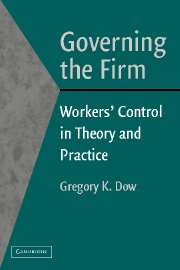Book contents
- Frontmatter
- Contents
- List of Tables and Figures
- Preface
- Governing the Firm
- 1 Introduction
- 2 Normative Perspectives
- 3 Workers' Control in Action (I)
- 4 Workers' Control in Action (II)
- 5 Conceptual Foundations
- 6 Explanatory Strategies
- 7 A Question of Objectives
- 8 Views from Economic Theory (I)
- 9 Views from Economic Theory (II)
- 10 Transitions and Clusters
- 11 Toward a Synthesis
- 12 Getting There from Here
- References
- Index
8 - Views from Economic Theory (I)
Published online by Cambridge University Press: 14 January 2010
- Frontmatter
- Contents
- List of Tables and Figures
- Preface
- Governing the Firm
- 1 Introduction
- 2 Normative Perspectives
- 3 Workers' Control in Action (I)
- 4 Workers' Control in Action (II)
- 5 Conceptual Foundations
- 6 Explanatory Strategies
- 7 A Question of Objectives
- 8 Views from Economic Theory (I)
- 9 Views from Economic Theory (II)
- 10 Transitions and Clusters
- 11 Toward a Synthesis
- 12 Getting There from Here
- References
- Index
Summary
Explaining the Rarity of Workers' Control
The time has come to survey some hypotheses concerning the rarity of LMFs and their observed distribution across industries. This chapter and the next address hypotheses offered by microeconomic theorists and writers in the new institutional economics, drawing on earlier work by Dow and Putterman (1999, 2000). Here I focus on asset ownership and work incentives. Chapter 9 continues this survey and critique by addressing capital constraints, portfolio diversification, and collective choice. Using the case studies from Chapters 3–4 and other empirical evidence, I will identify strengths and weaknesses in each approach, along with puzzles deserving further attention. While no hypothesis escapes unscathed, theory and evidence together suggest that some are more promising than others. Chapter 11 will weave the more successful ideas, and those of Chapter 10 on organizational demography, into a broad theoretical synthesis.
It may be that all of the hypotheses in the next few chapters contain some kernel of truth. The constraints on workers' control that prove binding could vary by industry, society, or historical epoch. Moreover, important interactions are likely to be overlooked when hypotheses are artificially grouped into a few simple categories. But one must start somewhere, and even if the reader rejects the synthesis proposed in Chapter 11, the effort made here to separate wheat from chaff should help clarify the issues at stake.
- Type
- Chapter
- Information
- Governing the FirmWorkers' Control in Theory and Practice, pp. 165 - 184Publisher: Cambridge University PressPrint publication year: 2003



